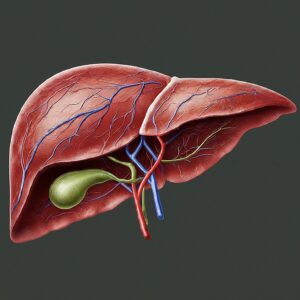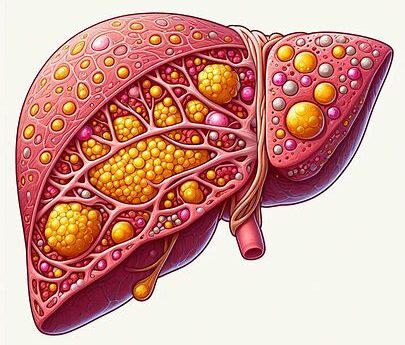What is Hepatitis B Virus
Hepatitis B infection is a serious viral infection that affects the liver and can lead to chronic liver disease, liver cancer, and other severe health complications. The virus is primarily transmitted through contact with infected blood, sexual contact, and from mother to child during childbirth. With millions of people worldwide affected by Hepatitis B, there is an ongoing search for effective ways to manage this condition. While conventional medical treatments are essential for managing the disease, there is growing interest in the potential role of herbal remedies in supporting liver health and aiding in the management of Hepatitis B.

Understanding Hepatitis B
Hepatitis B infection is caused by the Hepatitis B virus (HBV), which attacks the liver and can lead to both acute and chronic infections. Acute Hepatitis B may resolve on its own, while chronic Hepatitis B can persist for years and increase the risk of severe liver damage. The symptoms of Hepatitis B can range from mild to severe and may include jaundice, fatigue, nausea, abdominal pain, and dark urine.
Standard treatments for Hepatitis B include antiviral medications, immune system modulators, and regular monitoring of liver function. While these treatments can help control the virus and prevent complications, they may not completely eliminate the virus from the body. This has led some individuals to explore complementary approaches, including herbal remedies, to support their overall health and manage the condition more effectively.
Herbal Remedies for Managing Hepatitis B infection
Herbal remedies have been used for centuries in traditional medicine systems to support liver health and treat various ailments, including viral infections. Several herbs are believed to have properties that may help manage Hepatitis B by enhancing the immune system, reducing inflammation, and protecting the liver from further damage.

1. Milk Thistle (Silybum marianum)
Milk Thistle is one of the most widely studied herbs for liver health and has been used for centuries to treat liver disorders. The active compound in Milk Thistle, known as silymarin, is believed to have antioxidant, anti-inflammatory, and antiviral properties. Some studies suggest that silymarin may help protect liver cells from damage caused by Hepatitis B, reduce liver inflammation, and improve liver function.
2. Licorice Root (Glycyrrhiza glabra)
Licorice Root is another herb with a long history of use in traditional medicine. The active compound in Licorice Root, glycyrrhizin, has been shown to have antiviral and anti-inflammatory effects. Some research suggests that glycyrrhizin may inhibit the replication of the Hepatitis B virus and reduce liver inflammation. However, it is important to use Licorice Root with caution, as excessive consumption can lead to side effects such as high blood pressure and electrolyte imbalances.
3. Turmeric (Curcuma longa)
Turmeric is a popular spice known for its anti-inflammatory and antioxidant properties, thanks to its active compound curcumin. Curcumin has been studied for its potential to reduce liver inflammation and protect liver cells from damage. Some studies suggest that curcumin may help manage Hepatitis B by reducing liver inflammation and improving overall liver health.
4. Phyllanthus (Phyllanthus niruri)
Phyllanthus, also known as “Stonebreaker,” is an herb used in traditional Ayurvedic and Chinese medicine to treat liver disorders. Research has shown that Phyllanthus may have antiviral properties that can inhibit the replication of the Hepatitis B virus. Additionally, Phyllanthus has been found to improve liver function and reduce liver damage in some studies.
5. Dandelion Root (Taraxacum officinale)
Dandelion Root is commonly used in herbal medicine to support liver health and detoxification. It is believed to help stimulate bile production, improve digestion, and protect the liver from toxins. While there is limited research on Dandelion Root’s effectiveness specifically for Hepatitis B, it is often used as part of a holistic approach to liver health.
Considerations and Precautions
While herbal remedies may offer potential benefits for managing Hepatitis B, it is important to approach them with caution. Herbal remedies should not replace conventional medical treatments for Hepatitis B but can be used as complementary therapies to support liver health and overall well-being. It is essential to consult with a healthcare provider before starting any herbal remedies, especially if you are taking antiviral medications or have other health conditions.
Additionally, the quality and potency of herbal supplements can vary, so it is important to choose reputable brands and products that have been tested for safety and efficacy. Always follow the recommended dosages and be aware of potential interactions with other medications.
Conclusion
Hepatitis B infection is a serious condition that requires careful management and ongoing medical care. While herbal remedies may offer some support in managing the condition and promoting liver health, they should be used in conjunction with, not as a substitute for, conventional medical treatments. Herbs such as Milk Thistle, Licorice Root, Turmeric, Phyllanthus, and Dandelion Root have shown promise in supporting liver function and managing Hepatitis B, but more research is needed to fully understand their effectiveness.
If you are considering using herbal remedies to manage Hepatitis B, it is crucial to consult with your healthcare provider to ensure that they are safe and appropriate for your individual needs. By taking a holistic approach that includes both conventional and complementary therapies, you can better manage Hepatitis B and support your overall health and well-being. To purchase a comprehensive liver supplement, click here.
Frequently Asked Questions
Can hepatitis B infection go away?
Acute Hepatitis B infection can go away on its own in some cases, as the immune system fights off the virus. However, chronic Hepatitis B infection usually persists and requires ongoing management. While it can be controlled with antiviral treatments, it often cannot be completely cured. Regular medical monitoring and care are essential to manage the disease and prevent complications.
What happens to a person with hepatitis B infection?
A person with Hepatitis B may experience symptoms such as jaundice, fatigue, nausea, abdominal pain, and dark urine. In chronic cases, the virus can cause long-term liver damage, leading to cirrhosis, liver cancer, and liver failure. Some individuals may remain asymptomatic, but they can still transmit the virus to others.
What is the best treatment for hepatitis B infection?
The best treatment for Hepatitis B typically includes antiviral medications, such as tenofovir or entecavir, which help reduce the viral load and slow the progression of liver disease. Regular monitoring by a healthcare provider is crucial to assess liver function and determine the most appropriate treatment plan based on individual needs.
Can a person with hepatitis B infection live long?
Yes, with proper management and treatment, a person with Hepatitis B can live a long, healthy life. Regular medical care, antiviral medications, and lifestyle changes can help prevent complications such as cirrhosis and liver cancer, allowing individuals to maintain their overall health and well-being.
How do you flush out hepatitis B infection?
There is no way to “flush out” Hepatitis B from the body completely. However, antiviral medications can help reduce the viral load in the blood. Maintaining a healthy lifestyle, avoiding alcohol, and regularly monitoring liver health can also support the body’s ability to manage the virus effectively.
What are the herbal remedies for hepatitis B infection?
Herbal remedies for Hepatitis B may include Milk Thistle, Licorice Root, Turmeric, Phyllanthus, and Dandelion Root. These herbs are believed to support liver health, reduce inflammation, and potentially inhibit viral replication. However, they should be used with caution and under the guidance of a healthcare provider.
What foods should you avoid if you have hepatitis B infection?
If you have Hepatitis B, it’s advisable to avoid alcohol, as it can worsen liver damage. Also, limit foods high in saturated fats, processed sugars, and salt, which can strain the liver. Instead, focus on a balanced diet rich in fruits, vegetables, lean proteins, and whole grains to support liver health.
What is the latest medicine for hepatitis B infection?
The latest treatments for Hepatitis B include antiviral medications like tenofovir alafenamide (TAF) and entecavir. These drugs help suppress the virus and reduce liver inflammation. Research is ongoing to develop more effective therapies, including potential curative treatments and immune-modulating therapies.
Which injection can cure hepatitis B infection?
Currently, there is no injection that can cure Hepatitis B. Vaccines are available to prevent the infection, and antiviral injections like interferon can help manage the virus. However, these treatments are not cures. Ongoing research aims to develop curative therapies for Hepatitis B.
How to convert hepatitis B positive to negative?
Converting Hepatitis B positive to negative is challenging, especially in chronic cases. Antiviral treatments can suppress the virus to undetectable levels, but this does not mean the virus is eradicated. In rare cases, the immune system may clear the virus, but ongoing management and monitoring are necessary.
What is the new treatment for hepatitis B infection in 2024?
As of 2024, research is focusing on new antiviral drugs, immune-modulating therapies, and combination treatments to more effectively manage and potentially cure Hepatitis B. Advances in gene editing and therapeutic vaccines are also being explored as innovative approaches to treat and possibly eradicate the virus.
What are Hepatitis B symptoms?
Hepatitis B symptoms may include jaundice (yellowing of the skin and eyes), fatigue, nausea, vomiting, abdominal pain, dark urine, and pale stools. In some cases, individuals may be asymptomatic, especially in chronic infections, but they can still transmit the virus to others.
Are there Hepatitis B vaccines?
Yes, there are effective vaccines available for Hepatitis B. The Hepatitis B vaccine is typically given in a series of three to four shots, providing long-term protection against the virus. Vaccination is recommended for all infants, unvaccinated adults at risk, and healthcare workers.
Are there Hepatitis B treatments?
Yes, Hepatitis B can be treated with antiviral medications like tenofovir, entecavir, and pegylated interferon. These treatments help reduce the viral load, prevent liver damage, and lower the risk of complications. Regular monitoring and liver function tests are essential to guide treatment.
What are the causes of Hepatitis B infection?
Hepatitis B is caused by the Hepatitis B virus (HBV), which is transmitted through contact with infected blood, bodily fluids, or sexual contact. It can also be passed from mother to child during childbirth. Sharing needles, unprotected sex, and exposure to contaminated medical equipment are common transmission routes.
What are possible ways for Hepatitis B transmission?
Hepatitis B is transmitted through contact with infected blood, semen, or other body fluids. This can occur through unprotected sex, sharing needles, exposure to contaminated medical equipment, or from mother to child during childbirth. Vaccination and safe practices can help prevent transmission.
Is hepatitis B infection curable?
Currently, Hepatitis B is not curable, especially in chronic cases. However, it can be effectively managed with antiviral medications that suppress the virus and reduce liver damage. Ongoing research is focused on developing curative treatments, but for now, management and prevention are key.
![]()





